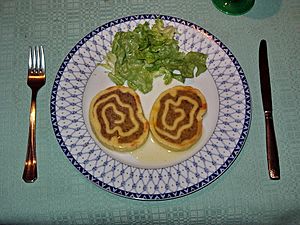Fleischschnacka facts for kids
Fleischschnacka is a traditional dish from Alsace, a region in France. Its name means "meat snails" in the local Alsatian language. This unique meal is made by rolling a savory meat filling inside fresh pasta. It's a popular and comforting food in Alsace.
Contents
What is Fleischschnacka?
Fleischschnacka is a type of pasta roll filled with meat. The main ingredients for the filling usually include:
- Cooked meat, often leftover from a stew called pot-au-feu
- Eggs
- Onions
- Parsley
- Salt and pepper for seasoning
This mixture is spread thinly over fresh egg pasta dough. The dough is then carefully rolled up into a long tube.
How Fleischschnacka is Made
After the meat filling is rolled inside the pasta, the long tube is cut into slices. Each slice is about 1.5 to 2 centimeters thick. These slices are the individual Fleischschnacka pieces.
To cook them, the slices are first browned in a frying pan with butter. This gives them a nice golden color. Then, broth (often the same broth used for pot-au-feu) is added to the pan. The Fleischschnacka rolls then simmer in the broth for about 12 minutes until they are fully cooked and tender.
How to Enjoy Fleischschnacka
Traditionally, Fleischschnacka is served with a small amount of the cooking broth. It is also very common to enjoy it alongside a fresh green salad. This combination creates a balanced and delicious meal.
The Meaning Behind the Name
The name Fleischschnacka comes from two Alsatian words:
- Fleisch, which means "meat"
- Schnacka, which means "snails"
So, the name literally translates to "meat snails." This refers to the spiral shape of the dish once it's sliced, which looks a bit like a snail's shell.
Similar Dishes
Fleischschnacka shares similarities with another dish called Maultaschen. Maultaschen are popular in Germany, especially in the region of Baden-Württemberg. This area is right next to Alsace. Maultaschen are also a type of meat-filled pasta. When Maultaschen are cut in half, they can look quite similar to Fleischschnacka. Both dishes show how food traditions can be shared between neighboring regions.


